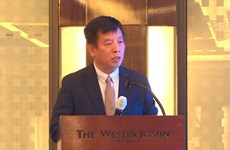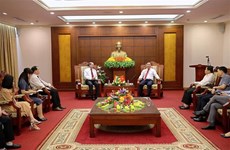VN stresses reasonable justifications for UN budget
All resources appropriations must be
accompanied by reasonable justifications and the United Nations must be
in a position to proceed from existing resources, a Vietnamese
representative to the UN has said.
All resources appropriations must be
accompanied by reasonable justifications and the United Nations must be
in a position to proceed from existing resources, a Vietnamese
representative to the UN has said.
Addressing a two-day meeting in New York to discuss the proposed programme budget for the biennium 2010-2011, Ambassador Bui The Giang, Deputy Permanent Representative of Vietnam praised the UN Secretariat for its timely submission of the programme.
According to the programme, the level of resources proposed for this biennium amounts to 4,887.5 million USD, only very slightly above the total approved outline level of 4,871.1 million USD set out in Resolution 63/266 adopted by the General Assembly last year.
In the context of economic and financial crisis as well as chronic global food insecurity, this amount will make the delivery of the UN’s mandates more challenging, Giang said.
“What is problematic in this regard is not simply whether the world has enough resources, but whether the resources available are properly allocated and effectively spent,” he added.
The ambassador applauded the Advisory Committee on Administrative and Budgetary Questions (ACABQ)’s valuable recommendations on many specific questions in the areas of management, monitoring as well as evaluation of achievement and shortcomings of the UN’s programmes and activities, particularly in using results-based approach in the budgeting process.
He called on the entire system of the UN to work harder to drastically reduce administrative costs, make full use of information technology and devote more resources to development purposes so as to benefit an increasing number of countries, especially developing countries that account for the majority of the Organization’s membership and also the majority of the world’s affected populations.
He said that Vietnam look forward to the joint efforts of Committee members in carefully reviewing and consensually finalizing the proposed program budget for the biennium 2010-2011. Vietnam pledges its full, constructive and active participation throughout this process, he concluded./.
Addressing a two-day meeting in New York to discuss the proposed programme budget for the biennium 2010-2011, Ambassador Bui The Giang, Deputy Permanent Representative of Vietnam praised the UN Secretariat for its timely submission of the programme.
According to the programme, the level of resources proposed for this biennium amounts to 4,887.5 million USD, only very slightly above the total approved outline level of 4,871.1 million USD set out in Resolution 63/266 adopted by the General Assembly last year.
In the context of economic and financial crisis as well as chronic global food insecurity, this amount will make the delivery of the UN’s mandates more challenging, Giang said.
“What is problematic in this regard is not simply whether the world has enough resources, but whether the resources available are properly allocated and effectively spent,” he added.
The ambassador applauded the Advisory Committee on Administrative and Budgetary Questions (ACABQ)’s valuable recommendations on many specific questions in the areas of management, monitoring as well as evaluation of achievement and shortcomings of the UN’s programmes and activities, particularly in using results-based approach in the budgeting process.
He called on the entire system of the UN to work harder to drastically reduce administrative costs, make full use of information technology and devote more resources to development purposes so as to benefit an increasing number of countries, especially developing countries that account for the majority of the Organization’s membership and also the majority of the world’s affected populations.
He said that Vietnam look forward to the joint efforts of Committee members in carefully reviewing and consensually finalizing the proposed program budget for the biennium 2010-2011. Vietnam pledges its full, constructive and active participation throughout this process, he concluded./.













